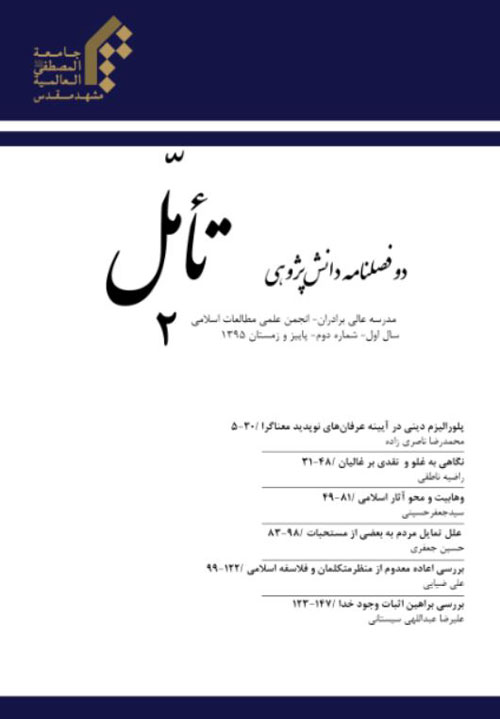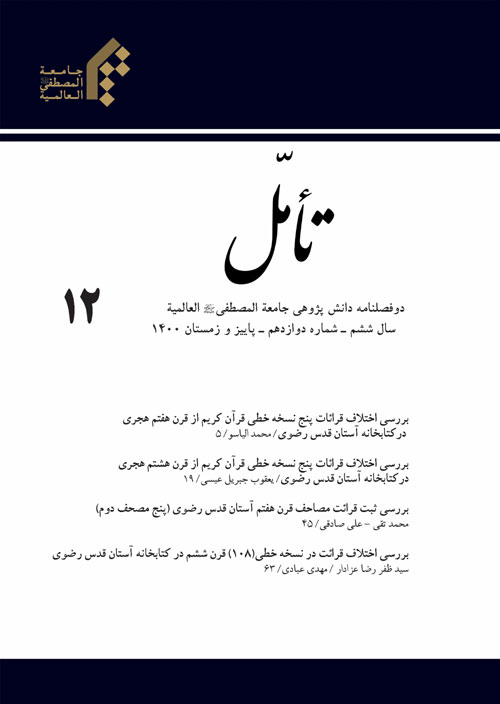فهرست مطالب

نشریه دانش پژوهی تامل
پیاپی 2 (پاییز و زمستان 1395)
- تاریخ انتشار: 1395/12/27
- تعداد عناوین: 7
-
صفحات 5-30واکنش فرامدرن در مقابله با طرز تفکر مدرنیته، نقش اساسی معنویت را در تعریف هویت به رسمیت میشناسد و تفکیک خودسرانه زندگی مردم را به دو عرصه خصوصی و عمومی، سکولار و مقدس به چالش میکشد.از بحرانهای عصرحاضر، احساس پوچی، سرگردانی و بیهدفی است. یافته های پژوهش نشان میدهد که این امر علت اصلی در ظهور ادیان نوپدید و بروز هم توان بحث پلورالیزم دینی میباشد. این مطالعه با روش توصیفی- تحلیلی به بررسی در متون, کتب و مقالات با استفاده از کلید واژه پرداخته است. در ابتدا پس از مطرح ساختن بحث «ظهور عرفانهای نوظهور معناگرا» و «پلورالیزم دینی» به نقش «هویت سازی دینی» به عنوان یک ابزار پرداختهاست. آنچه ظاهر مساله بیان میکند که تاثیر حمایتی از سوی پلورالیزم دینی بر حفظ «عرفانهای نوپدید» در سطح جهان میباشد، اما با توجه به یافته های این مطالعه میتوان به نقش دوطرفه کنشی، واکنشی حفظ و بقا بین «پلورالیزم دینی» و «اصل ظهور عرفانهای» نوپدید در سطح جهان، بویژه در کشورهای اسلامی اشاره کرد.کلیدواژگان: پلورالیزم، پلورالیزم دینی، عرفانهای نوپدید، معنویت نوظهور، هویتسازی دینی، هویتسازی معنوی
-
صفحات 31-48«غلو» به عنوان جریانی انحرافی در دین و دینداری و نیز اهل غلو از دیرباز از پدیده ها و معضلات فرهنگ اسلامی نزد مسلمانان شناخته میشوند. «غلو» در لغت به معنای تجاوز و زیادهروی از حد و اندازه است؛ «غالیان»: کسانیاند که به امیرمومنان - و امامان دیگر از نسل آن حضرت- نسبت خدایی دادند. جهل و محبت زیاد از سوی شیعیان سادهدل و رسیدن به جاه و مال از سوی رهبران «غلات»، از مهمترین انگیزه های غلوکنندگان است. با استناد به آیات و روایات و موضعگیری اهلبیت و همچنین مخالفت متکلمان و علماء امامیه با «غالیان»، بطلان این عقیده اثبات میشود. زیارت جامعه کبیره، مملو از ذکر فضایل ائمه اطهار است، لکن هیچگونه تعبیر غلوآمیزی در آن نشدهاست. در انتها به نقد نظریه علمای ابرار که منزلت ائمه را در حد دانشمندان پرهیزکار پایین میآورند و مدعیاند، شیعه صفات فوق بشری را به ائمه نسبت میدهد میپردازیم.کلیدواژگان: غلو، غالیان، اهل بیت، تشیع
-
صفحات 49-81پایه های فکری جریان وهابیت، به وسیله ی «ابن تیمیه» پی ریزی و به دست «محمد بن عبد الوهاب»، به کمک سرویسهای جاسوسی استعمارگران، به ویژه انگلیس مستحکم گشت. زیرا استعمارگران در پی ایجاد درگیری درونی، میان جهان اسلام بودند. به همین منظور وهابیت و تکفیری ها را به خدمت گرفتند، تا اهداف آنان را محقق سازد. اکنون این نوشته، به همین موضوع میپردازد. ابتدا شناخت پیشوای وهابیت، آل سعود، پیوند آن دو و ذکر بخشی از جنایاتشان و در دو فصل بعدی، به بحث و بررسی وهابیت عامل دست استعمار، که با محو و نابودی آثار اسلامی، خسارات فراوانی بر دنیای اسلام تحمیل کردهاند و در حال حاضر درجهت تامین منافع اسرائیل و غرب گام برمیدارند.کلیدواژگان: سلفی، تکفیر، محمد بن عبد الوهاب، آل سعود، استعمار، آثار فرهنگی و تاریخی
-
صفحات 83-98این مقاله در صدد نقد و بررسی مساله «گرایش به بعضی از مستحبات و دورشدن از واجبات» است، هر چند احکام مستحبی در اسلام مورد تاکید بوده و آثار و ثواب فراوان برای آن ذکر شدهاست؛ اما گاهی یک عمل مستحبی بقدری برای بعضی اهمیت پیدا میکند که حاضرند واجبی را ترک کنند، تا آن مستحب را از دست ندهند، برخی اعمال بظاهر مذهبی بر خلاف آموزه های دینی و دستور خدا، پیامبر و امام انجام می شود و با ریا، تظاهر، اسراف و خوش گذرانی همراهاست؛ این در حالی است که بسیار از پژوهشگران ومبلغان دینی به اینگونه مسائل بطور باید وشاید توجه نکردهاند. نگارنده در این مقاله به مطالبی چون «مفهوم شناسی واجب»، «فرق واجب و لازم»، «مفهوم شناسی مستحب»، «اقسام واجب» ، «اهمیت واجب و مستحب در اسلام»، «علل روی گردانی مردم از واجبات و توجه به مستحبات»، پرداخته و در صدد مطرح کردن مسالهی گرایش به بعضی از مستحبات به عنوان یک مشکل اساسی در جوامع اسلامی است.کلیدواژگان: اسلام، مردم، تمایل، واجبات، مستحبات
-
صفحات 99-122امکان تحقق یک پدیده به دو وجود که در اصطلاح «اعاده معدوم» نامیده میشود، از مباحث مهم و جنجال برانگیز کلام، فلسفه و عرفان اسلامی است. این مقاله بر مبنای سوالات زیر طرح شدهاست: 1) لفظ اعاده به چه معنا است؟ 2) اعاده معدوم چیست؟ 3) چه کسانی اعاده معدوم را جایز دانستهاند و چه دلایلی داشته اند؟ 4) چه کسانی آن را محال دانستهاند و با چه دلایلی این حکم را دادهاند؟ 5) پس از دانستن معنای اعاده معدوم مساله معاد چگونه حل می شود ؟ در این مقاله دو دیدگاه متکلمان و فلاسفه، در مورد اعاده معدوم بررسی شده و همچنین مسائلی را که متکلمان در باب جواز اعاده معدوم از معاد جسمانی بیان کرده اند، مطرح شده است . ما سعی کردیم تا دراین مقاله در حد امکان به پرسش های مطرح شده پاسخ دهیم.کلیدواژگان: اعاده معدوم، معاد، معاد جسمانی، تکرر وجود، وجود
-
صفحات 123-147عظمت و والایی هر علمی، به عظمت موضوع آن است، با توجه به این معیار کلی و فراگیر ارزشمند ترین علم، همانا «توحید» است، از این روی معرفت و شناخت حقیقت لایزالی، سرآغازی هر اقدام و قیامی است. طرق رسیدن به این معرفت به عدد نفوس خلایق است، اما از دیدگاه اسلام و قرآن هرچند ایمان و باور قلبی و فکری خوب است اما یقین و یافتن بالاتر از آنست، اینجاست که باید براهینی را برای اثبات وجود خدا اقامه کرد که اقناع کننده نفس انسان باشد. این مجال به بررسی براهین ذات باری تعالی - با تکیه بر روش هایی که جنبه استدلالی دارند- پرداخته است، از جمله برهان حدوث، وجوب و امکان، صدیقین، نظم؛ می توان گفت بهترین برهان تقریر علامه طباطبایی و طریق کتاب و سنت جامع و مازاد بر همه روش ها است، علاوه بر اینکه کمالات آنها را داراست، از نقائص آنها نیز مبرا می باشد.کلیدواژگان: براهین، اثبات، وجود خدا، فلاسفه، متکلمین، دلیل
-
صفحات 150-155
-
Pages 5-30The postmodern reaction against the modern thinking recognizes the fundamental role of spirituality in definition of identity and challenges the division of the people's life to private and public field or secular and holy. Futility, confusion and aimlessness are among the crises of the present time, and therefore, the wars, murder and suicide are spreading. The findings of the present research show that the above mentioned phenomena are the main factors of emergence of the new theosophies and the issue of religious pluralism.Keywords: pluralism, religious pluralism, new theosophies, new spirituality, religious identification, spiritual identification
-
Pages 31-48Exaggeration is a deviation in religion and religiousness and the exaggerators has always been known as a dilemma in the Islamic culture. Exaggeration means going beyond the due measures, and the exaggerators are those who believe Imam Ali and the other Imams are gods. The ignorance and inordinate love by some naive Shi'as and desire of some leaders of the exaggerators to reaching wealth and power are among the motives of the exaggerators. By reference to the verses and the Hadiths and the positions taken by Ahl Al – Bait and also opposition of the Shi'a theologians and scholars to the exaggerators, the falseness of the belief can be proved. The great comprehensive Ziarat is full of the excellences of the Imams but no exaggeration is included in it. At the end, the idea of those who have reduced the position of the Imams to the pious Ulama and claimed that Shi'as attribute ultra-human characteristics to their Imams is critiqued.Keywords: exaggeration, exaggerators, Ahl Al-Bait, Shi'a
-
Pages 49-81The bases of Wahhabism thought was established by Ibn Taymiah and fortified by Muhammad Ibn Abdul Wahhab and intelligence services of the colonialists especially the Britain, since the colonialists were seeking to create internal conflicts in the Islamic world and to achieve this aim, employed Wahhabism and the Takfirists. The present paper studies this problem. At first, the identity of the leader of Wahhabism, Al Saud and their connection and some of the crimes they have committed are studied. Then the last two sections discuss Wahhabism as a tool in the hands of colonialism which has inflicted many damages to the Islamic world by destroying the Islamic monuments and now works for the interests of Israel and the west.Keywords: Salafi, takfir, Muhammad ibn Abdul Wahhab, Al Saud, colonialism, cultural, historic monuments
-
Pages 83-98The present paper studies and critiques the tendency of people to some recommended and getting away from the obligatory. Although the recommended edicts are important in Islam and there are many results and awards promised for them, but sometimes a recommended edict becomes so important for some people that replaces the obligatory ones. Furthermore, some so called religious practices are done with profusion, extravagance and luxuriousness contrary to the commands of Allah and the prophet, while many of the religious researchers and preachers do not pay attention to this kind of issue as they should. The present paper has studied the definition of obligatory (Wajib), the difference between obligatory and necessary, the definition of recommended (Mustahab), the types of obligatory, the importance of obligatory and recommended edicts in Islam and the causes of people's tendency to some of the Recommended edicts and getting away from the obligatory ones, and has propounded the issue as a fundamental problem in the Islamic societies.Keywords: Islam, people, tendency, the obligatory, the recommended
-
Pages 99-122The present paper is based on the following questions: What is the meaning of "Restoration"? What is "Restoration of Non"? Who have seen Restoration of Non, possible? And why? Who have seen it impossible? And why? After knowing the meaning of Restoration of Non, how can we solve the issue of resurrection? Two ideas of the theologians and philosophers about Restoration of Non and the issues that the theologians have propounded about Restoration of Non in physical resurrection are studied in the paper. The paper has tried to answer the above mentioned questions and explain what it has concluded from the study.Keywords: Restoration, Non, Restoration of Non, resurrection, physical resurrection, repetition of existence, existence
-
Pages 123-147The greatness and superiority of any knowledge is based on greatness of its subject. According to this general criteria, "monotheism" is the most valuable knowledge. Therefore, knowledge as to the eternal reality is the beginning of any action and movement. The paths to this knowledge are as many as the number of the creatures. From the viewpoint of Islam and the Qur'an, although the faith of heart and mind is good, but certainty and finding is better. Therefore, we should use arguments for proving the existence of God that are convincing for the spirit of mankind. The present paper has studied the arguments proving the existence of Allah, emphasizing on the methods that have reasoning aspects, among which are the proofs of creation, necessity and possibility, the veracious and discipline. It can be said that Allamah Tabataba'ee's presentation is the best proof, and the method of the Qur'an and Sunnah is the most comprehensive one, since it has the advantages of all the other methods and is free of their defects.Keywords: arguments, proof, God's existence, philosophers, theologians, reason


